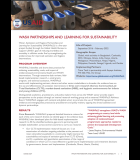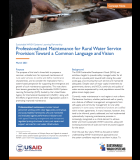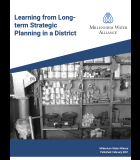Productive Safety Net Program Graduation with Resilience to Sustainable Development (PSNP-GRAD)
PSNP-GRAD seeked to bring change on multiple levels including: economic opportunities, financial services, agricultural extension services, women’s resiliency, nutritional status, and climate change resiliency, while creating a sustainable environment that is collaborative and inclusive for participants, in order to graduate families out of social assistance programs, and create long term food security for communities in Ethiopia.
The project activities were designed to incrementally increase households' participation in diverse economic activities, while also strengthening and facilitating linkages between GRAD participants and input suppliers, service providers, and local/regional markets. The program also included activities aimed to build household and community resilience by building income and asset bases. GRAD engaged men and women to promote gender equality and create more equitable outcomes.
Activity Description
GRAD aimed to accomplish its goal by implementing the following strategies:
- Enhance livelihoods options of chronically food insecure households in highland areas;
- Improve community and household resilience;
- Strengthen enabling environment to promote scale and sustainability; GRAD also works through the Village Economic and Social Association (VESA) group model, which is designed to help poor households save money, gain access to loans provided by the group, and access loans from microfinance institutions.
Building on local traditions, the project established Village Economic and Social Associations (VESAs). VESAs were the focal point for most project interventions and provide a cohesive environment for introducing savings and credit, financial literacy, small business planning/management, and other economic skills, in ways that were accessible to both women and men. Through the VESAs, community members wee trained in activities that help build resilience and on how to engage in one of five major value chains. After receiving loans from VESAs, GRAD households worked with project support to access larger and longer-term agricultural loans from formal microfinance institutions (MFIs).
GRAD used awareness raising sessions and positive role models to improve attitudes and practices towards women. To assure structural change, the project worked with key government actors (such as Ethiopian government health and agricultural workers) to raise awareness of gender issues, analyze key challenges to gender equality and food security, and build strategies to create gender equality.
GRAD recognized that good nutrition plays a critical role in human development and long-term household livelihood security. To complement Ethiopia’s National Nutrition Program, the project provided training sessions in the VESA. Men and women learned a variety of good nutrition practices in these sessions, including exclusive breast-feeding in addition to complementary food for children over 6 months of age.
Increasingly erratic weather patterns in the Ethiopian highlands are having a negative impact on agricultural production and household income. GRAD used climate information systems to share information with communities about climate risks. It also introduced adaptation tools such as small scale irrigation and fast maturing or drought resistant crops.
Expected Outcomes
- Reduce the status of food insecurity in targeted households;
- Improve the nutritional status of the households by increasing production/income and promoting appropriate food utilization;
- Increase economic growth opportunities and diversify livelihoods by promoting on-and off-farm income generating activities;
- Demonstrate market-driven approaches for targeted food-insecure households;
- Improve access to microfinance services through a graduated assistance program;
- Create sustainable demand for extension services; and
- Through FTF, link the GRAD program with other projects in both pastoral and productive Ethiopia.
Actual Outcomes
- 70% of targeted households were involved in Value Chain Activities and 65% of VESA members have formal microfinance credit
- GRAD created 2,591 VESAs, with 57,175 members.
- Most participants reported that women had increased household decision-making abilities. Women made up 36% of the participants trained on improved technologies and/or agricultural practices, and 39% of participants linked to output markets were women.
- Essential Nutrition Actions trainings were held for 54,029 households. Also, 15,147 households were trained on dietary diversity and 16,366 households were trained in food preparation for children.
- 84% of households adopted at least two practices associated with climate change adaptation, and 96% have adopted at least one practice including early maturing crop varieties, moisture conserving practices, and drought tolerant crop types and varieties.





